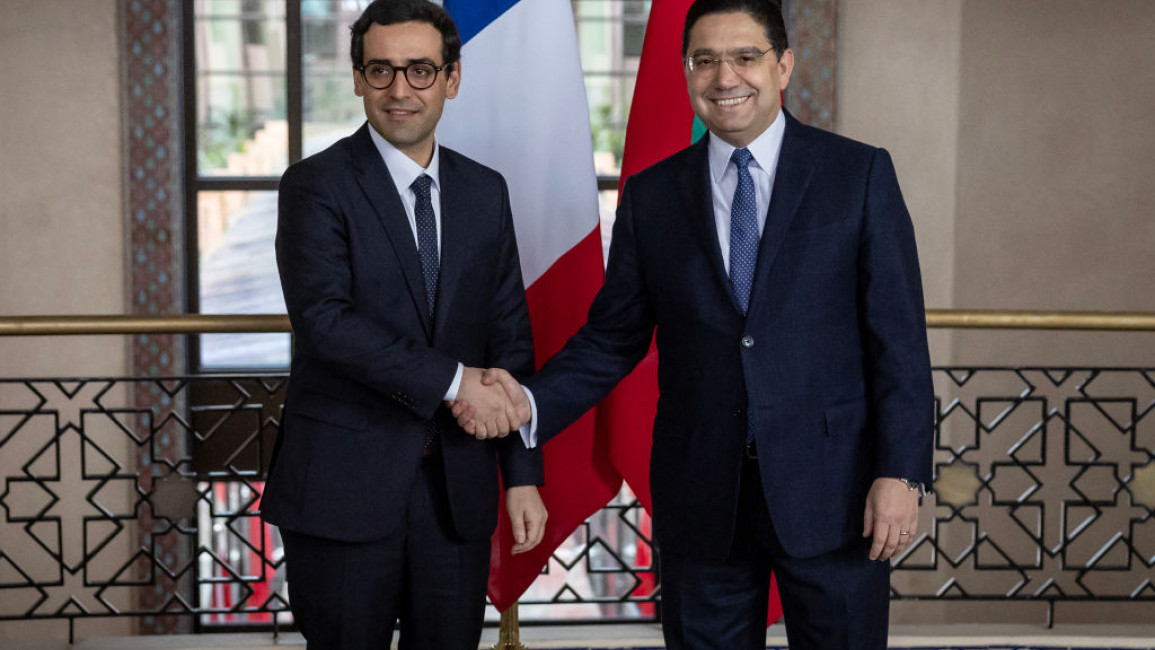France to invest in Western Sahara after reconciliation with Morocco, despite risking anger from Algeria
France is poised to begin investing in the disputed territory of Western Sahara as Paris and Rabat rekindle their friendship and resolve a two-year-long diplomatic conflict.
Africa Intelligence, a France-based pan-African media outlet, revealed on 1 April that "The Quai d'Orsay is now encouraging French groups to place their pawns (in the territory)."
During his visit to Rabat in February, French Foreign Minister Stéphane Séjourné affirmed that his government is willing to "accompany Morocco in its development" of the territory.
"Morocco has invested a lot in development projects for the benefit of local populations and in areas such as training, renewable energies, tourism, and the blue economy related to aquatic resources," he said in a press statement on 28 February, following his meeting with his Moroccan counterpart, Nasser Bourita.
While Séjourné avoided discussing France's position vis-à-vis Morocco's sovereignty over Western Sahara, the FM's endorsement of Rabat's investments in the territory represented a significant move from Paris.
According to another report by Africa Intelligence, the French Minister Delegate for Foreign Trade, Franck Riester, will arrive in Rabat later this week on his first official trip to the North African Kingdom.
Africa Intelligence's tip added, "The granting of structuring projects in the Sahara to French groups could be on the agenda of Riester's visit."
This comes after two years of a diplomatic crisis between Paris and Rabat.
Although speculative, the first signs of coldness between Paris and Rabat started showing right after the Pegasus scandal. In 2021, the daily Le Monde revealed that Macron's and fifteen members of the French government's cell phones were likely among the targets of an unidentified Moroccan security service.
Since then, communication between President Macron and King Mohammed VI has reportedly stopped.
Paris' 'ambiguous' position on Western Sahara, a key diplomatic issue for the Moroccan state, and its decision to halve the issuance of visas to Moroccans have further fueled Rabat's anger.
As France endeavoured to mend ties with its former colonies, Rabat and Algiers, Macron has avoided indulging in the Sahara file - an issue the regional arch-enemies don't take lightly.
Algeria supports the separatist movement of Polisario, which also claims sovereignty over the territory. The UN recognises neither Morocco nor Polisario's claims.
However, Macron's new government seems ready to take a bolder position on the conflict and perhaps risk its fragile friendship with Algeria.
Nevertheless, Paris' motives are political and economic, as several other Western investors, including the US, eye the phosphate-rich region.
On 3 April, the US Department of State announced its readiness to finance projects that aim "to promote inclusive economic growth in Dakhla and Laayoune. (...) Funding of up to US$500,000 is now open for proposals."
Last August, 94 French parliamentarians pointed out, in a joint statement published on Le Figaro, "the French hesitations on the Sahara and the tightrope policy of the Quai d'Orsay with Algeria, [which] push the Royal Palace to seek military or economic partners elsewhere than in Paris".
Several other French political figures are pushing l'Élysée for a Pro-Morocco position regarding the disputed territory, including former President Francois Sarkozy and newly-appointed French Minister of Culture Rachida Dati.

![Trump's warm greeting to Netanyahu contrasted with Kamala Harris's critical reception [Getty]](/sites/default/files/styles/image_330x185/public/2024-07/GettyImages-2162908988.jpg?h=69f2b9d0&itok=OLc5dL88)
![The brutal assault on Khan Younis has killed dozens and displaced thousands more [Getty]](/sites/default/files/styles/image_330x185/public/2024-07/GettyImages-2162526709.jpg?h=d3eda8cf&itok=n5N-o8p5)
![Members of the Algerian delegation threw roses into the Seine [Getty]](/sites/default/files/styles/image_330x185/public/2024-07/GettyImages-2162980872.jpg?h=199d8c1f&itok=h_3o_TOL)